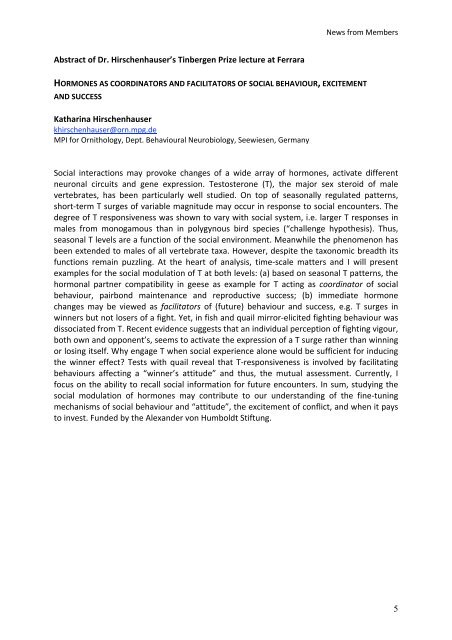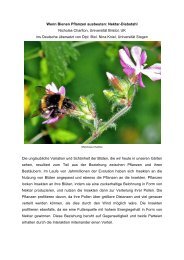PhDâ€theses - Ethologische Gesellschaft
PhDâ€theses - Ethologische Gesellschaft
PhDâ€theses - Ethologische Gesellschaft
Create successful ePaper yourself
Turn your PDF publications into a flip-book with our unique Google optimized e-Paper software.
Abstract of Dr. Hirschenhauser’s Tinbergen Prize lecture at Ferrara<br />
News from Members<br />
HORMONES AS COORDINATORS AND FACILITATORS OF SOCIAL BEHAVIOUR, EXCITEMENT<br />
AND SUCCESS<br />
Katharina Hirschenhauser<br />
khirschenhauser@orn.mpg.de<br />
MPI for Ornithology, Dept. Behavioural Neurobiology, Seewiesen, Germany<br />
Social interactions may provoke changes of a wide array of hormones, activate different<br />
neuronal circuits and gene expression. Testosterone (T), the major sex steroid of male<br />
vertebrates, has been particularly well studied. On top of seasonally regulated patterns,<br />
short‐term T surges of variable magnitude may occur in response to social encounters. The<br />
degree of T responsiveness was shown to vary with social system, i.e. larger T responses in<br />
males from monogamous than in polygynous bird species (“challenge hypothesis). Thus,<br />
seasonal T levels are a function of the social environment. Meanwhile the phenomenon has<br />
been extended to males of all vertebrate taxa. However, despite the taxonomic breadth its<br />
functions remain puzzling. At the heart of analysis, time‐scale matters and I will present<br />
examples for the social modulation of T at both levels: (a) based on seasonal T patterns, the<br />
hormonal partner compatibility in geese as example for T acting as coordinator of social<br />
behaviour, pairbond maintenance and reproductive success; (b) immediate hormone<br />
changes may be viewed as facilitators of (future) behaviour and success, e.g. T surges in<br />
winners but not losers of a fight. Yet, in fish and quail mirror‐elicited fighting behaviour was<br />
dissociated from T. Recent evidence suggests that an individual perception of fighting vigour,<br />
both own and opponent’s, seems to activate the expression of a T surge rather than winning<br />
or losing itself. Why engage T when social experience alone would be sufficient for inducing<br />
the winner effect? Tests with quail reveal that T‐responsiveness is involved by facilitating<br />
behaviours affecting a “winner’s attitude” and thus, the mutual assessment. Currently, I<br />
focus on the ability to recall social information for future encounters. In sum, studying the<br />
social modulation of hormones may contribute to our understanding of the fine‐tuning<br />
mechanisms of social behaviour and “attitude”, the excitement of conflict, and when it pays<br />
to invest. Funded by the Alexander von Humboldt Stiftung.<br />
5



